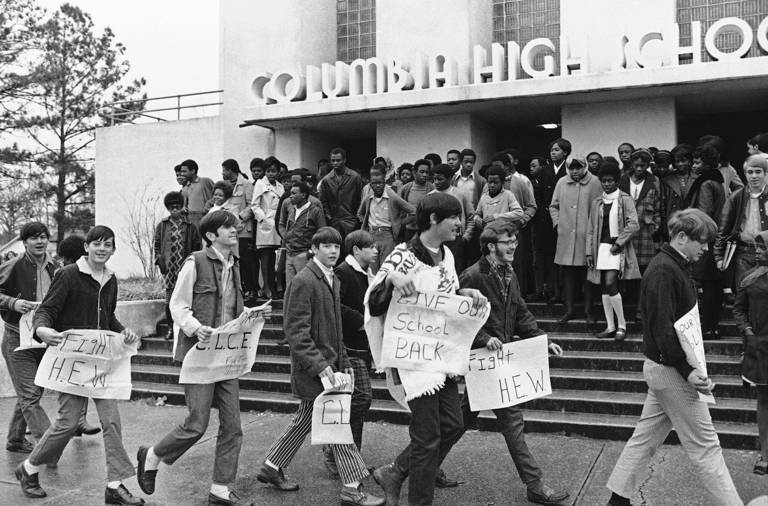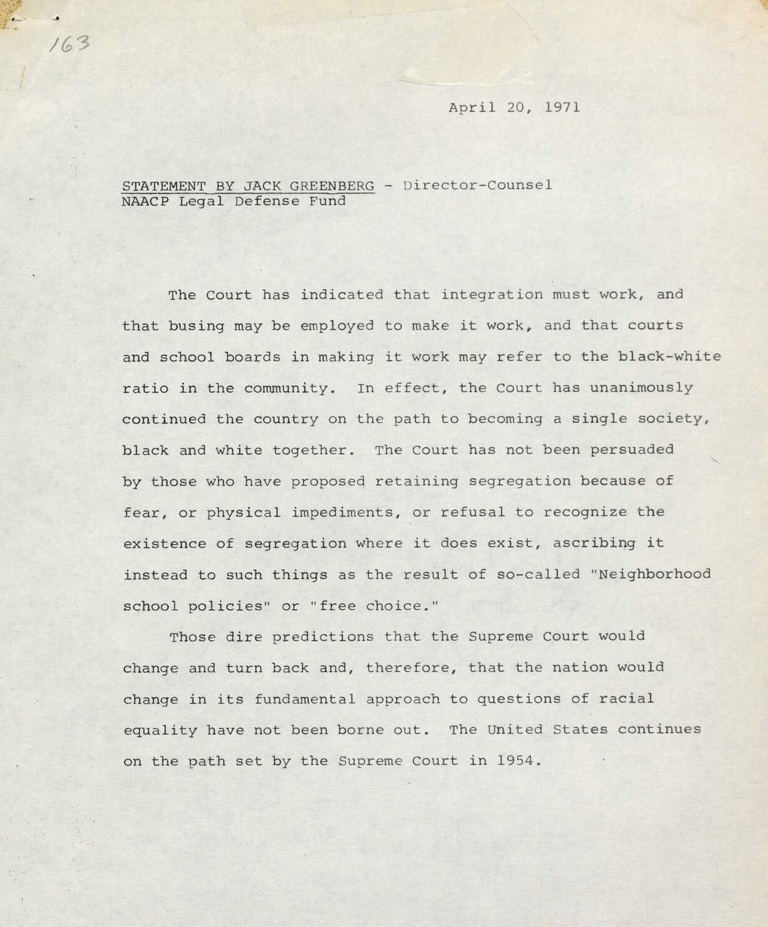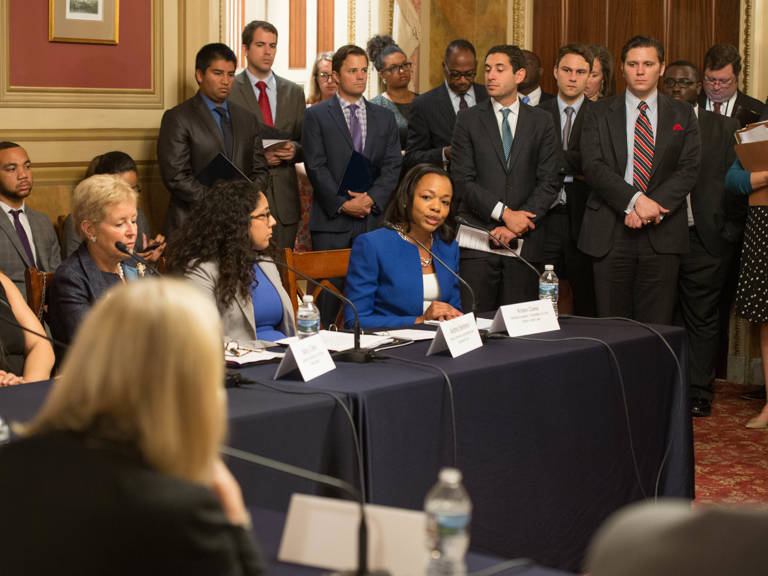
White students march outside a high school in Columbia, Mississippi, in January 1970 in protest of the U.S. Supreme Court’s desegregation plan. Credit: AP Images.
“School Choice”: Reviving Segregationist Strategies and the Fight for Public Education
The Legal Defense Fund (LDF) hoped that their 1954 victory in Brown v. Board of Education would achieve widespread school desegregation nationwide. While the Brown decision ignited the Civil Rights Movement and paved the way for desegregated housing and public accommodations, it also ushered in an era of massive resistance and strategies that perpetuated segregation in public education. One such strategy was the adoption of “freedom of choice” plans that allowed parents to choose to send their children to white or Black public schools. These plans, in effect, imposed the duty to desegregate schools on parents—rather than on the state and local school officials who had created the dual racial school system.

LDF statements on school desegregation, April 1971.
In 1968, the U.S. Supreme Court unanimously decided in Green v. County School Board of New Kent County that these choice plans were not sufficient to bring about a desegregated public school system. The Court found that it was school districts’ “affirmative duty” to integrate schools. As school officials across the country responded to the ruling by adopting practices like busing to integrate public schools, many white families opted out—transferring their children to private schools.
The nature and extent of that “white flight” was documented in Norwood v. Harrison, a lawsuit argued by LDF lead counsel Melvyn R. Leventhal and decided by the U.S. Supreme Court in 1973. Norwood was a class action lawsuit brought on behalf of Black parents whose children were enrolled in Mississippi public schools. It challenged a 1942 state law that provided state-owned textbooks to all elementary and secondary schools in Mississippi. In Norwood, LDF lawyers demonstrated that legal mandates requiring the desegregation of Mississippi public school systems were being undermined by the mass transfer of white students to newly opened all-white private schools. LDF lawyers argued that the state’s practice of providing textbooks to those all-white private schools violated the state’s duty to desegregate its public schools. By providing textbooks and other resources to white private schools, the state made it significantly easier for white families to abandon the desegregated public schools. The U.S. Supreme Court agreed with LDF in a unanimous decision, resulting in the end of the state’s disputed policy and practice.

Norwood v. Harrison Appellants’ Brief
The Mississippi attorney general’s arguments in defense of the textbook program, while ultimately unsuccessful in the case of Norwood, advocated for freedom of school choice. The brief claimed, “It is private choice and not school books that is luring students from the public schools. Moreover, the plaintiff’s constitutional right is one of attendance at schools, not attendance with pupils.” In effect, the state’s lawyers challenged the scope of the government’s duty to desegregate schools and students’ right to learn in integrated classrooms.

Read Mississippi’s argument in Norwood v. Harrison
Recent calls for the privatization of public education follow this logic, wholly ignoring the federal government’s duty to promote integration and painting “school choice” as the ultimate equalizer for students and their families. For example, Mandate for Leadership 2025: The Conservative Promise, more commonly known as Project 2025, outlines a plan to strip the federal government of influence or any role at all in local school systems by dismantling the U.S. Department of Education. In November 2024, U.S. Senator Mike Rounds of South Dakota introduced the “Returning Education to Our States Act” to accomplish this goal, arguing that “local control is best” and that students will benefit from limits on the federal government’s oversight of public education. In addition, on May 5, 2025, Texas Governor Greg Abbott signed Senate Bill 2, which provides $1 billion for a universal private school voucher system and is set to begin in the 2026-27 school year.
Examples of school choice policies
“Vouchers are state-funded programs—often called scholarship programs—that allow students to use public monies to attend a private school. The state provides a set amount of money for private school tuition. This amount is typically based on the state’s per-pupil amount.”
“Tax credit scholarship programs provide a tax credit to businesses and individual taxpayers for donating funds to scholarship granting organizations. Nonprofit organizations manage and distribute donated funds in the form of private school tuition scholarships to eligible students.”
“Education Savings Accounts (ESA) are private savings accounts funded by a deposit from the state government and managed by a parent or guardian. The deposit amount varies from state-to-state and is typically based on the state’s per-pupil amount. To use an ESA, parents withdraw their child from the public school system and use their ESA funds to purchase specified educational services, like tutoring, online courses, or private school tuition.”
However, these bills and their proponents ignore the dire consequences of this shift—and the threats it poses to educational equity and Black students’ civil rights. In a recent report, LDF’s Thurgood Marshall Institute summarized several of Project 2025’s education recommendations and their impact on Black communities, including weakening students’ legal protections from discrimination, eliminating Head Start and access to quality early childhood education, and adopting “school choice” policies like vouchers and education savings accounts that will privilege wealthy families. The federal government and some states are already acting on several of these proposals. While these policies will be harmful for all students, they present a particular threat to Black students. This is because Black students already receive disproportionate punishment in the classroom, are the second-largest demographic enrolled in Head Start, and are more likely to attend public schools.
Learn more about Project 2025—which the current administration is implementing at a frightening speed—and its threats to providing Black students with a safe, inclusive, and quality education.
Just as arguments for “school choice” were mobilized to justify the transfer of public resources to white schools in the 1970s, current calls for education reform request federal funding for private choices that will likely worsen inequity in schools. While Project 2025’s authors argue that providing parents with state funds in the form of school vouchers will lead to better education outcomes for all, research shows the opposite. The National Education Association reports that vouchers “steal scarce funding from public schools—which serve 90 percent of students—and give it to private schools that are unaccountable to taxpayers.” Further, inside those private institutions, students may lack the protections afforded by the public school system. As the Center for American Progress reports, while public schools must uphold federal civil rights protections, students attending private schools through voucher programs can be denied opportunities based on factors like race, ethnicity, gender presentation, or disability.
While the current demands for school choice suggest a return to an old agenda of inequity in schooling, they also serve as a reminder of the strength of previous arguments in defense of public education. As was successfully argued in Norwood, tax dollars should not be transferred to private institutions at the expense of all students’ right to a fair and well-funded education.


